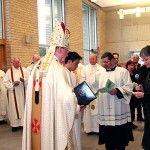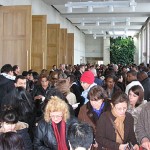The scriptures tell us that when all things were in quiet silence and the night was in the midst of its course God’s almighty word leapt down from heaven, from his royal throne.
This night is filled with magic. Mary gives birth to Jesus and the heavens are filled with songs of peace and good will. Startled shepherds are called to see the new born king of the Jews. We never grow tired of hearing Luke’s gospel of tidings of great joys for all people. We never grow tired of hearing the good news that a savior is born for us – Christ the Lord.
This is the season for giving gifts and a common question asked at this feast of Christ’s birth is, what did you get for Christmas? A more important question might be, ’what gifts do you already have?
Would you ever consider that that greatest gift is yourself? Do you ever stop and think about whom you are, your personality, your uniqueness. Do you know that before the world began God chose you to be God’s son or daughter? Such was his will and pleasure. We had nothing to do with it. That’s the truth, the wonder Christmas celebrates; God sent his Son into the world, into our lives; not to condemn us, not to get us, but to embrace us as his adopted sons and daughters. This is a gift we will possess and hopefully cherish all our lives. Sure we have our faults and failing, sure we’ve disappointed ourselves and others by decisions we’ve made. They are only a part of us, our shadow side. We may be mistake making people but we are good people, good people who do good things, loving things, generous things in our lives and they are more part of us than our shadows.
What did you get for Christmas? The gift of your life, the gift of health, the gift of seeing and hearing and movement. What did you get for Christmas? Look at the person next to you, your spouse and your children, your friend. What did you get for Christmas, the gift of faith that makes you a member of this parish, that helps you hear and believe the scriptures, that enables you to say ‘Amen’ I believe, as you receive the body of Christ at Communion. We are surrounded with gifts, gifts we too often take for granted, but still gifts.
We find our gifts, not under the Christmas tree but under the tree of life, the cross of Christ, who by dying restored the bond we have with the living God and enriches us with all these gifts. What did we get for Christmas, Emmanuel – God with us and us with God. So un-wrap the gift you are and share yourself with family and friends and all who come into your life every day of life. May we be blessed with a holy and grateful Christmas.
 Founded by St. Paul of the Cross, every Passionist takes a special vow to spend his or her energies in promoting remembrance of the sufferings of Jesus, the memory of the Cross, and reflection of the meaning of the Cross for the world.
Founded by St. Paul of the Cross, every Passionist takes a special vow to spend his or her energies in promoting remembrance of the sufferings of Jesus, the memory of the Cross, and reflection of the meaning of the Cross for the world.




